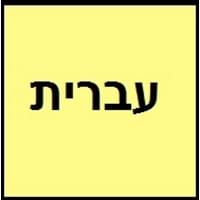Japanese vs Hebrew
National Language
Japan
Israel
Second Language
Not spoken in any of the countries
Israel
Speaking Continents
Asia, Pacific
Africa, Asia, Europe
Minority Language
Palau
Poland
Regulated By
Agency for Cultural Affairs (文化庁) at the Ministry of Education
Academy of the Hebrew Language
Interesting Facts
- In Japanese Language, there are 4 different ways to address people: kun, chan, san and sama.
- There are many words in Japanese language which end with vowel letter, which determines the structure and rhythm of Japanese.
- The original language of Bible is Hebrew.
- The men and women use different verbs in hebrew language.
Similar To
Korean Language
Arabic and Aramaic languages
Derived From
Not Available
Aramaic Language
Alphabets in
Japanese-Alphabets.jpg#200
Hebrew-Alphabets.jpg#200
Writing Direction
Left-To-Right, Horizontal, Top-To-Bottom
Right-To-Left, Horizontal
Hello
こんにちは (Kon'nichiwa)
שלום (Shalom)
Thank You
ありがとう (Arigatō)
תודה (Toda)
How Are You?
お元気ですか (O genki desu ka?)
מה שלומך? (ma shlomxa)
Good Night
おやすみなさい (Oyasuminasai)
לילה טוב (Laila tov)
Good Evening
こんばんは (Konbanwa)
ערב טוב (Erev tov)
Good Afternoon
こんにちは (Konnichiwa!)
אחר צהריים טובים (Achar tzahara'im tovim)
Good Morning
おはよう (Ohayō)
בוקר טוב (Boker tov)
Please
お願いします (Onegaishimasu)
בבקשה (bevekshah)
Sorry
ごめんなさい (Gomen'nasai)
סליחה! (Slicha)
Bye
さようなら (Sayōnara)
להתראות (Lehitraot)
I Love You
愛しています (Aishiteimasu)
אני אוהבת אותך (Ani ohevet otcha)
Excuse Me
すみません (Sumimasen)
בבקשה!
Dialect 1
Sanuki
Ashkenazi Hebrew
Where They Speak
Kagawa
Israel
How Many People Speak
Not Available
Dialect 2
Hakata
Samaritan Hebrew
Where They Speak
Fukuoka
Israel, Palestine
Dialect 3
Kansai
Yemenite Hebrew
Where They Speak
kansai
Israel
Speaking Population
Not Available
Second Language Speakers
Not Available
Native Name
日本語
עברית / עִבְרִית (ivrit)
Alternative Names
Not Available
Israeli, Ivrit
French Name
japonais
hébreu
German Name
Japanisch
Hebräisch
Pronunciation
/nihoɴɡo/: [nihõŋɡo], [nihõŋŋo]
[(ʔ)ivˈʁit] - [(ʔ)ivˈɾit]
Ethnicity
Japanese (Yamato)
Not Available
Language Family
Japonic Family
Afro-Asiatic Family
Subgroup
Not Available
Semitic
Branch
Not Available
Canaanitic
Early Forms
Old Japanese, Early Middle Japanese, Late Middle Japanese and Early Modern Japanese
Biblical Hebrew, Mishnaic Hebrew, Medieval Hebrew, Hebrew
Standard Forms
Japanese
Modern Hebrew
Signed Forms
Signed Japanese
Signed Hebrew
Scope
Individual
Individual
ISO 639 6
Not Available
Not Available
Glottocode
nucl1643
hebr1246
Linguasphere
45-CAA-a
12-AAB-a
Language Type
Living
Living
Language Linguistic Typology
Subject-Object-Verb
Subject-Verb-Object, Verb-Subject-Object
Language Morphological Typology
Agglutinative, Synthetic
Fusional, Synthetic
Japanese and Hebrew Language History
Comparison of Japanese vs Hebrew language history gives us differences between origin of Japanese and Hebrew language. History of Japanese language states that this language originated in 1185 whereas history of Hebrew language states that this language originated in 1000 BC. Family of the language also forms a part of history of that language. More on language families of these languages can be found out on Japanese and Hebrew Language History.
Japanese and Hebrew Greetings
People around the world use different languages to interact with each other. Even if we cannot communicate fluently in any language, it will always be beneficial to know about some of the common greetings or phrases from that language. This is where Japanese and Hebrew greetings helps you to understand basic phrases in Japanese and Hebrew language. Japanese word for "Hello" is こんにちは (Kon'nichiwa) or Hebrew word for "Thank You" is תודה (Toda). Find more of such common Japanese Greetings and Hebrew Greetings. These greetings will help you to be more confident when conversing with natives that speak these languages.
Japanese vs Hebrew Difficulty
The Japanese vs Hebrew difficulty level basically depends on the number of Japanese Alphabets and Hebrew Alphabets. Also the number of vowels and consonants in the language plays an important role in deciding the difficulty level of that language. The important points to be considered when we compare Japanese and Hebrew are the origin, speaking countries, language family, different greetings, speaking population of these languages. Want to know in Japanese and Hebrew, which language is harder to learn? Time required to learn Japanese is 88 weeks while to learn Hebrew time required is 44 weeks.





